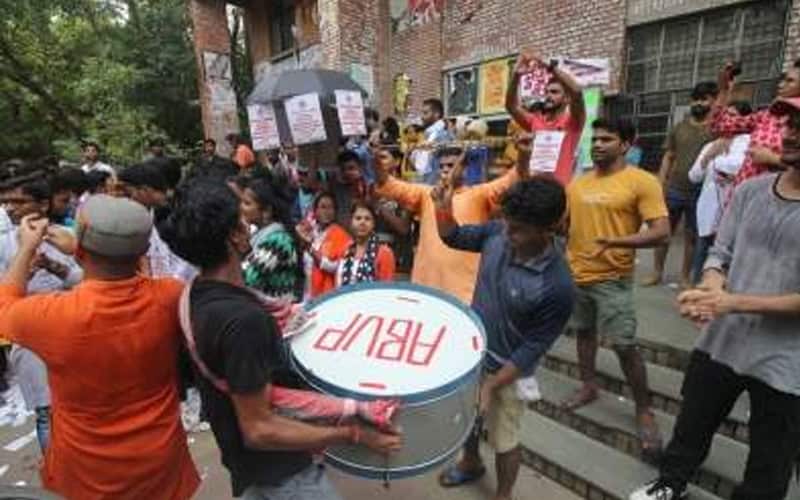Elections for a students’ union in a university may not exactly be a do-or-die situation for the contestants but it is quite a serious affair for the political parties involved through the contesting organisations.
After all, the results in such elections indicate as to which way the wind is blowing regarding developments in the country, as far as the youth are concerned.
Keeping this in mind, the contesting organisations and the political parties backing them take no chances.
This was clear in the just-held elections for the Jawaharlal Nehru University Students Union (JNUSU).
The prestigious university has traditionally been a stronghold of the Left but this time the students’ organizations affiliated with the Left roped in others to take on BJP-affiliated Akhil Bharatiya Vidyarthi Parishad (ABVP).
The Left-affiliated All India Students’ Association (AISA), Students’ Federation of India (SFI), Democratic Students’ Federation (DSF) and All India Students’ Federation (AISF) are contesting the polls together.
The ABVP says the Left candidates looked for alliance beyond their Front as it feared loss in the elections.
“Left has been in alliance (among themselves) since 2016 but this time they joined more parties with them because they fear the rise of our party,” said Durgesh, the presidential candidate of ABVP.
Responding to this, Satish Chandra Yadav, Left alliance’s candidate for the post of general secretary, said, “This is not Left Unity, it is student unity. ABVP’s claim that we are uniting because of fear is completely frivolous and baseless.”
He added, “This unity is a larger message, not only for the campus but also for the people outside. This is an alliance against the fascist policies of the government and also its action of hijacking the institutions. This is the voice of resistance.”
Yadav said the Left this time was “not fighting against ABVP, our main opponent was the Vice Chancellor and his administration.”
Congress-backed National Students Union of India (NSUI) said, “It’s not the ABVP which has grown stronger during this election. It is us. The hypocrite Left is fighting in an alliance and not only students are part of it even the Professors are asking for votes in their name and the same is the case with ABVP who has the backing of the Vice Chancellor and the JNU administration.”
The university saw a turnout of 67.9 per cent voters on Friday. This is believed to be the highest the university has ever seen in seven years.
Voting has already taken place and the results were supposed to be declared on September 8. However, two students approached the Delhi High Court, alleging that rules were not followed. The court ordered a stay on declaration of results till September 17.
In the initial trends, the Left Unity was leading on all the major seats of the JNU student union polls.
After counting of 550 ballots out of 1841, Aishe Gosh from Left Unity was leading for the post of president with 266 votes, much ahead of Jitendra Suna of Birsa Ambedkar Phule Students’ Association (BAPSA) Fraternity.
Saket Moon from Left unity was leading for the post of vice president with 360 votes, Satish Chandra Yadav for the post of general Secretary with 261 votes and Mohammad Danish for the post of joint secretary with 353 votes.
The counting of votes for JNU polls began after an 11-hour delay due to the stalemate between the students and the administration.
The counting process, which began at 11.55 pm on September 6, had to be put on hold due to a dispute between the students and the university’s Grievance Redressal Cell (GRC).
The university’s EC chairman Shashank Patel said the counting process had to be put on hold due to a deadlock between the student community and the JNU’s Grievance Redressal Cell (GRC) over the latter’s demand that the counting agents give a written undertaking stating they would not disclose the results.
“The EC tried its best to convince the GRC to change its stand based on the demands of the student community,” Patel said, adding that the deadlock led to an 11-hour delay in the counting process.
After the consensus wasn’t reached even after the passage of several hours, the EC decided to resume the counting of votes anyway with declaration of trends, the EC chairman said. The result, however, will be put on hold, he added.

